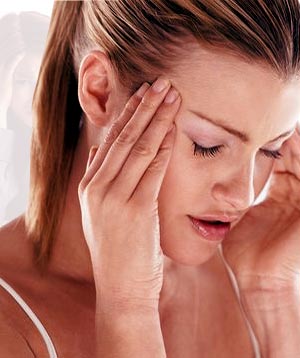
It is estimated that between 40 and 50 million Americans suffer from chronic headaches. Headaches are believed to be the result of an electrical and chemical imbalance at centers in the brain that regulate blood vessels around the head and neck. Headaches may be caused by a wide variety of factors including stress, reactions to certain foods, hormonal imbalances, genetic predisposition, fatigue, noise, and glare.
• What are the different types of headaches?
• When should I consult a physician?
• How can I prevent a headache?
• How do I treat a headache?
• Are there effective alternative remedies for treating a headache?
What are the different types of headaches?
Tension headaches are the most common type and are typically caused by muscle contraction in the head and neck. Lasting between five and six hours, a tension headache is characterized by dull, steady pain that feels like a band tightening around your head. Vascular headaches, which include cluster and migraine headaches, are the result of overactive blood vessels. A migraine can last between 12 and 24 hours and is often accompanied by nausea and other symptoms. Cluster headaches, which typically affect men, are accompanied by throbbing pain around one red, watery eye, and nasal congestion. A sinus headache is characterized by congestion and steady pain behind your face that worsens if you bend forward.
When should I consult a physician?
While most people experience occasional tension headaches, in certain cases a headache may be a symptom of a more serious condition. A very severe headache that appears suddenly, one that continues for more than a week following a head injury, or one that worsens instead of getting better with time, should be investigated. If your headache is accompanied by fever and a stiff neck, see your physician to rule out meningitis or another serious infection. Also consult a doctor if your headache is accompanied by disturbed vision or speech, numbness or weakness on one part of the body, blackouts, or confused thinking, or loss of memory.
How can I prevent a headache?
• Exercise regularly
• Try to reduce stress
• Identify precipitating factors including foods, alcohol, and oversleeping. Trigger foods typically include hard cheeses, chocolate, dairy products, MSG, and caffeine.
• Avoid overuse of pain relievers. Rebound headaches can occur when pain relievers are taken too often, reducing your body’s natural ability to fight pain. When using over-the-counter (OTC) drugs, follow package directions.
How do I treat a headache?
In most cases, you will probably find relief in OTC pain relievers (aspirin, acetaminophen, and ibuprofen).
• For chronic headaches, you should consult your physician.
• For sinus headaches, decongestants and antibiotics can provide relief.
Are there effective alternative remedies for treating a headache?
• Supplements and herbal products have been shown to be effective in preventing migraines.In particular, magnesium supplements, riboflavin and the herb feverfew (Tanacetum parthenium) may be worth trying if you suffer from migraines.
• Biofeedback and relaxation therapy have been shown to help relieve tension headaches. Biofeedback is a method of learning to regulate biological processes such as heartbeat, blood flow, and blood pressure. Relaxation therapy takes many forms, including meditation, visualization, and breathing exercises, which are most productive if practiced daily.
• Chiropractic manipulation has been shown to alleviate tension headaches caused by muscle strain brought on by poor posture. Some studies have shown spinal manipulation to result in better long-term benefits and fewer side effects than drug therapy. If your job requires you to sit for long periods, work at a computer, or perform repetitive motions, chiropractic may help reduce the incidence of headaches.
• Hypnosis has been shown to work as a treatment for chronic pain, but its success depends to a large extent on an individual’s responsiveness to hypnotic suggestion. Hypnosis is similar to relaxation therapy, but it also allows a therapist to access subconscious parts of the mind, which may reveal emotional traumas or underlying psychological causes of stress.
• Acupuncture may help to reduce pain and frequency of headaches. It is believed that the thin needles used in treatment may stimulate the nervous system to release endorphins or other chemicals and hormones that affect mood and pain perception. Studies suggest that acupuncture is most effective in tension-type headaches and migraines.
The following remedies are supported by anecdotal information, but have not been studied in clinical trials.
• Massage therapy can relax the headache-induced pain in muscles in the head, neck, face, and shoulders.
• Homeopathic remedies are available over-the-counter to treat specific types of headaches, but are best prescribed by a homeopathic practitioner, since ideally each remedy is tailored to an individual’s unique characteristics. There is no danger in trying a remedy for an acute headache, however, and homeopathy books are helpful in describing specific headache symptoms for each remedy.
• Aromatherapy oils that may help relax muscles and ease headache pain include lavender, eucalyptus, wintergreen, peppermint, and rosemary. Aromatherapy oils can be applied through massages, baths, and vaporization.
Consult your physician before trying an alternative therapy. Be sure to mention if you are taking any prescription or non-prescription drugs.

No comments:
Post a Comment